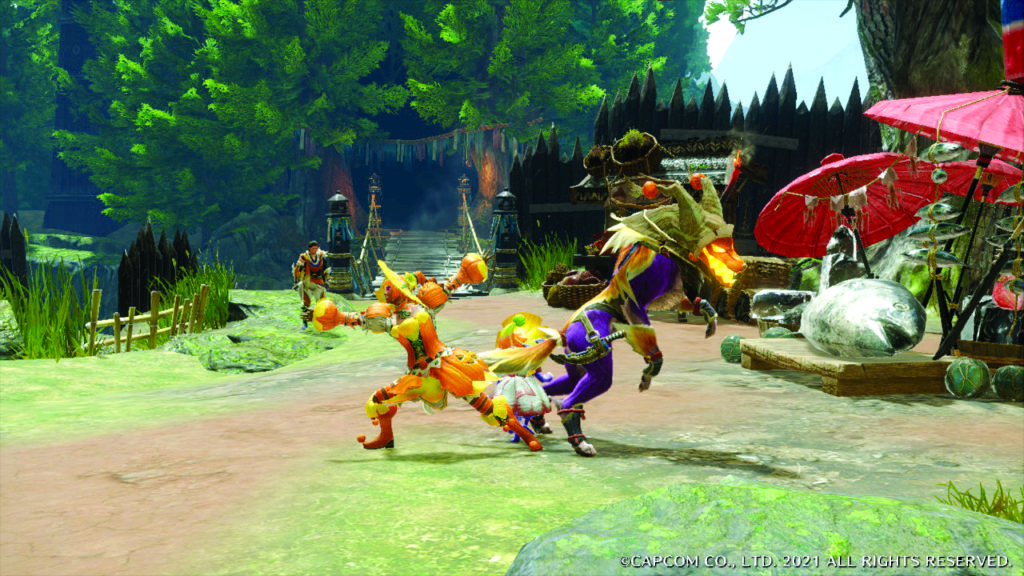With a franchise running as long as Monster Hunter—over fifteen years—it can be tricky to keep things fresh. While Monster Hunter Rise doesn’t seem to do much to iterate over previous generations of games, it’s the little quality of life details which make it the most accessible game in the series I’ve played and one begging to be played with friends. That said, it’s an esoteric experience where newcomers will still want to get their feet wet with more experienced players.
The premise of Monster Hunter Rise is simple: you hunt monsters. What makes this unique and fun for the hours and hours you’ll spend with the game are the variety of monsters and the sense of progression you get seeing your character’s outfit and weapons and even pets grow stronger and more outlandish. At its core, Monster Hunter is an RPG where your character stats and abilities grow not from traditional experience points, but by clothes and weapons you create from the monsters you’ve killed or captured. It’s rewarding to finally get the last few parts you need to finish off your look and there are many styles to choose from, though they’re mostly either suits of armor or Japanese-inspired outfits.
While the story elements take a backseat to the core gameplay, it’s for the best. Story never played an important part in Monster Hunter and this game is no different. The premise is monsters are attacking and it’s up to you to save the village and its inhabitants. It’s boilerplate at best, but compliments the action well enough.
The game as a whole has a colorful, playful tone which is reflected best in Kamura village. Anthropomorphic animals and smiling, upbeat villagers always have many things and puns to tell you. It can be overwhelming at times as the game’s way of teaching you about mechanics and other concepts is giving you a few paragraphs and smacking you on the back of the head. This is the largest hurdle for getting into the Monster Hunter franchise and unfortunately Rise does not do much to improve upon it.
What it does is improve on is quality of life features and stream-lining the core experience. There are many improvements—too many to list here—but nearly every issue most players had with older games in the franchise has been acknowledged and fixed.
Contrasting the friendly villagers are the monsters who are well designed and mostly feel unique to one another, though some can feel too similar. The large ones you’ll be hunting start off roughly your size but grow to be the size of buildings near the latter half of the game. Each monster has specific moves you’ll need to learn to avoid and certain tells to indicate how you’re doing. You can’t see your target’s health bar and it forces you to look at the scratches you leave on its hide or whether or not you’ve severed its tail. It’s one of the key draws of Monster Hunter for me, the relatively analog feel you get as opposed to most games where you’re watching an enemy’s HP slowly whittle away.
No hunter goes into a mission unarmed, and you have many different weapon types to choose from. They range from a basic sword and shield to comical miniguns to a horn which you can use to help your team and bash an enemy with at the same time. They all play differently and are worth experimenting with to see what you like best.
Where the game shines the most is its multiplayer aspect. You and up to three friends can join either locally or online to take on large monsters. The multiplayer works well and if you get a full party together you can lose track of time quite easily as the game has that addictive just one more hunt feel to it. Working together to bring down a terrifying monster you’ve struggled against alone is cathartic, and something I’ll be coming back to for months with my group of friends. Finding a steady group can be difficult and the game allows you to join strangers online as well. This method of play is less desirable, as you won’t know what you’re getting with strangers and convenient voice chat on the Switch still isn’t a reality.
Would I recommend Monster Hunter Rise? Yes, but with many caveats: look up a few video tutorials on core gameplay, find some friends to play with (ideally one of whom have played these games before), and don’t let the demo be your introduction to the game. It feels strange to have this many gotchas to a recommendation but the experience is something not quite mimicked elsewhere and one I’ve been addicted to for almost a decade now.



